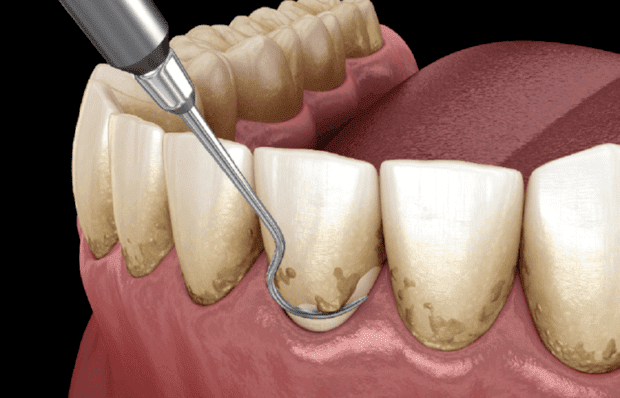Scaling and polishing are the most significant dental procedures intended for prophylaxis (or prevention of disease).Everyone is recommended to brush their teeth at least twice a day or after every meal to avoid teeth damage.
However, there are cases where plaque and tartar buildup still occurs. This happens because the mouth and the teeth have bacterial film.
The saliva contains calcium that is required for the teeth to keep them strong and healthy. As a person eats food, the food is transformed into starch or sugar, which then combines with bacteria.
As this cycle continues, the teeth will often expose to acids, which can harm the enamel and even the roots. Therefore, It is necessary, that regular brushing is complemented by a more thorough dental cleaning such as scaling and polishing.
Scaling is a procedure that includes removing the calculus deposits or stains on the teeth. Although scaling is performed on the teeth, it can also be performed on the roots especially in cases when periodontal pockets have already developed.
This happens when the bacteria have already invaded the gums. This process is known as root planing. Polishing, on the other hand, is the method of creating a smooth appearance on the teeth as scaling can make the teeth feel rough.
Who should undergo the treatment? What should you expect after the treatment?
People of different ages can consider undergoing scaling and polishing to achieve optimum oral health. Once the damage starts beginning a more complex dental procedure may have to be performed. Nevertheless, those who are experiencing the signs of the disease may still proceed with the scaling procedures as it can delay the progression.
A person who’s experiencing bad breath may think about deep cleaning with scaling and polishing. Bacteria may discharge certain substances due to their metabolic function and that will result in bad breath. In some cases, bad breath or halitosis is a sign of gum disease.
Depending on the rigor of the stains and the position of the teeth, the procedure may take one or a few cleaning sessions. There may be some minor discomfort especially if an ultrasonic instrument is used during scaling.
There may be numbness of the teeth and discomfort on the jaw due to the prolonged opening of the mouth. It may take at least an hour to complete the procedure.

How the procedure works?
The procedure may start by applying a local anesthetic to the gums and teeth to lessen discomfort. The dentist then uses a different type of instruments for scaling.
The dentist begins with an ultrasonic instrument that sends vibrations to the teeth to loosen the more visible and large deposits. The instrument blows cooling mist made of water to remove the debris away as the procedure goes on. The patient may be asked to spit once in a while to suspend the deposits.
Once the big deposits have been removed, the dentist may then shift to hand scalers, which are available in different sizes. Although using them may lengthen the procedure time, they give the dentist extra control as they can reach more difficult areas that cannot be reached by the ultrasonic instrument.
They can also be used to knock down smaller deposits, particularly those lodged in between teeth. After scaling is completed, the dentist may then continue with polishing using a hand piece equipped with a cup filled with soft rubber. The paste, which is usually made of fluoride, is then placed on the rubber cup.
The dentist rubs and moves the hand piece on the teeth, smoothing the newly cleaned areas.
The patient can back to routine activities, though he or she may not be allowed to eat or drink during the first 30 minutes to an hour.
Possible risks and complications:
Both of the procedures, as well as root planning, are generally safe. However, there may be some minor discomfort. Your jaw may be disturbed or you may experience slight sensitivity of teeth.
Reference:
Expert opinion
Dr. Reena Waghela Dental director at Sabka dentist says “There are areas in the mouth where the brush is hard to reach. Plaque can develop in such areas and cause a cavity. In regular cleaning sessions, such areas are detected and will be removed.”
Dr. Jena Shah Dental Director at Sabka Dentist says “Regular cleaning procedure keeps away the tension of oral threats. Makes sure your pearly whites live a long life.”










